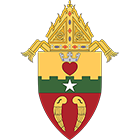Serving the people of West Texas
Search
Escaping death just the beginning for St. Christina the Astonishing
-
 July 24, 2025Her name says it all. For more than 700 years, she has been known as “St. Christina the Astonishing.” Every biographer calls her that.
July 24, 2025Her name says it all. For more than 700 years, she has been known as “St. Christina the Astonishing.” Every biographer calls her that.
Christina was born in Brustheim, near Liege, Belgium, in 1150. She was the youngest of three sisters and was orphaned when she was 15. Nothing remarkable or memorable had happened to Christina before then. Her life began to unravel when she had an epileptic fit when she was about 21. As was the custom then, she was presumed dead and her open coffin was carried to the church. During the Mass for the Dead, right after the Agnus Dei, according to an account in Butler’s Lives of the Saints, Christina sat up in the coffin and soared to the rafters of the church.
Everyone in the church fled except her elder sister and the priest. They coaxed her back down and she told them she took refuge in the rafters because she could not bear the smell of sinful human bodies.
Biographer John J. Delaney writes in the Dictionary of Saints that Christina told the priest that she had been to hell, purgatory, and heaven and was allowed to return to earth to pray for the suffering souls in purgatory.
She also told the priest that she recognized many friends in hell and had seen many more friends in purgatory. Tom Cowan in The Way of the Saints calls Christina “a holy and somewhat embarrassing fool for God” and believes that she had what we today call a near-death experience. But that was just the beginning of a life that was truly astonishing.
There are many incredible stories told about Christina. Because she could not tolerate the odor of human beings, Delaney writes, she escaped contact with them by climbing into trees, hiding in ovens, and even jumping into rivers.
Author Phillis McGinley (The Encyclopedia of Saints) believes there is some truth to some of the stories. She writes, “who could invent a character like Christina the Astonishing?” But McGinley cannot understand Christina’s aversion to being around humans who were unwashed — after all, this was the Middle Ages, and everyone was mostly unwashed.
Woodeene Koenig-Bricker (365 Saints) doesn’t think Christina would have made it through the modern canonization process. She writes, “there are some saints who, if they lived in the 20th century, would probably be declared insane, and Christina would certainly be one of them.”
For the rest of her life, Christina terrified and amazed people by her bizarre behavior. She is supposed to have prayed while balancing on a hurdle or curled up into a ball. She could handle fire without injuring herself and would often hurl herself into the river during the coldest weather.
Some people thought she was insane or that she was possessed. However, a few venerated her and even respected her. One biographer, Cardinal Jacques de Vitry, was the most credible witness to many of the extraordinary events in Christina’s life. He said that she was given the chance to return from death so she could spend her years of purgatory on earth.
After her near-death experience, Christina spent many years living a homeless life, begging for alms. She was also particularly charitable and served the poor and ill with devotion.
She spent the last years of her life in the convent of St. Catherine of Saint-Trond, where she died at the age of 74. She achieved respectability later in life and many people sought her wise advice. Her feast day is July 24. Prayers are traditionally said to Christina for those suffering from mental illness and for mental health workers.
Sarah Gallick writes in The Big Book of Women Saints that Herbert Thurston, the great Jesuit expert on mystic phenomena, conceded that Christina was blessed. He believed that it was the only way to account for the veneration in which she was held by the many sincere and intelligent people who knew her.- - -Mary Lou Gibson writes about the saints for the WestTexas Angelus from her home in Austin.
Photo: A cropped image of a prayer card from 1892 featuring St. Christina the Astonishing. Credit: Patrick3Lopez, CC BY-SA 4.0 <https://creativecommons.org/licenses/by-sa/4.0>;, via Wikimedia Commons
